
-
Find the right food for your petTake this quiz to see which food may be the best for your furry friend.Find the right food for your petTake this quiz to see which food may be the best for your furry friend.Health CategoryFeatured products
 Adult 6+ Large Breed Chicken Meal, Barley & Rice Recipe Dog Food
Adult 6+ Large Breed Chicken Meal, Barley & Rice Recipe Dog FoodSupports energy level, joint health, and beautiful coat in large breed mature dogs
Shop Now Healthy Mobility Large Breed Chicken Meal, Barley & Brown Rice Recipe Dog Food
Healthy Mobility Large Breed Chicken Meal, Barley & Brown Rice Recipe Dog FoodAdvanced nutrition shown to support joint health and improve mobility
Shop Now Adult Perfect Weight & Joint Support Chicken & Brown Rice Recipe Dog Food
Adult Perfect Weight & Joint Support Chicken & Brown Rice Recipe Dog FoodThis weight management and mobility support dog food was created with Hill’s unique understanding of the biology of overweight dogs.
Shop NowFeatured products Adult Perfect Weight Salmon & Vegetable
Adult Perfect Weight Salmon & VegetableOver 70% of cats lost weight within 10 weeks when fed this nutrition
Shop Now Kitten with Salmon
Kitten with SalmonPrecisely balanced nutrition with the delicious taste of minced salmon to help build immunity and a healthy digestive system
Shop Now Adult Indoor Savory Chicken Entrée Cat Food
Adult Indoor Savory Chicken Entrée Cat FoodPrecisely balanced nutrition for indoor cats with the delicious taste of savory minced chicken
Shop Now -
DogCat
- Cat Tips & Articles
-
Health Category
- Weight
- Skin & Food Sensitivities
- Urinary
- Digestive
- Kidney
- Dental
- Serious Illness
-
Life Stage
- Kitten Nutrition
- Adult Nutrition
Featured articles Pet Food Storage Tips
Pet Food Storage TipsWhere you store your cat and dog food can make a big difference in the quality and freshness once it is opened. Here are some common questions and recommendations for optimal storage for all of Hill’s dry and canned cat and dog food.
Read More Water
WaterWater is the most important nutrient of all and essential for life. Animals can lose almost all their fat and half their protein and still survive, but if they lose 15% of their water, it will mean death.
Read More The Right Diet For Your Pet
The Right Diet For Your PetLearn what to look for in healthy pet food & nutrition, including ingredients, quality of the manufacturer, your pet's age, and any special needs they have.
Read More -


When your dog looks up at you with those pleading eyes as you enjoy your meal, it's hard to resist sharing. But before you slip your dog a bite off your plate, it's crucial to know which human foods are safe for them and which could be harmful.
Dogs have different digestive systems and nutritional needs than humans, and some of our everyday foods can be toxic for them. Understanding what human food your dog can safely enjoy not only prevents health issues but also allows you to treat your pet occasionally without worry.
This comprehensive guide will help you navigate the world of human foods that are safe for your canine companion, those that should be limited, and those that must be avoided entirely.
Understanding Your Dog's Nutritional Needs
Dogs require a balanced diet consisting of proteins, fats, carbohydrates, vitamins, and minerals to maintain optimal health. While commercially prepared dog foods like Hill's Science Diet are formulated to meet these needs, some human foods can be included as occasional treats.
Dogs are primarily carnivores with omnivorous tendencies, meaning their bodies are designed to process mostly meat with some plant matter.
A balanced diet for dogs typically includes:
High-quality protein for muscle development and maintenance
Fats for energy, cell structure, and nutrient absorption
Carbohydrates for energy and digestive health
Vitamins and minerals for immune function and overall health
Commercial dog foods provide these nutrients in the proper ratios, which is why veterinarians recommend these as the foundation of your dog's diet. Treats, including safe human foods, should make up no more than 10% of your dog's daily caloric intake.
Safe Human Foods for Dogs - Fruits
Many fruits can be excellent occasional treats for dogs, providing vitamins, fibre, and antioxidants. Here are some fruits that are safe for dogs to eat:
Apples: Rich in vitamins A and C, as well as fibre. Remove the seeds and core as they contain small amounts of cyanide.
Bananas: High in potassium, vitamins, biotin, and fibre. Due to their high sugar content, bananas should be given in moderation.
Blueberries: Packed with antioxidants and phytochemicals, and may help prevent cell damage.
Strawberries: Contain fibre and vitamin C. Remove the stems before serving.
Watermelon: A hydrating treat that provides vitamins A, B6, and C. Remove all seeds and rind, as these can cause intestinal blockage.
Cantaloupe: Rich in vitamins A and C, as well as fibre and water. Remove the seeds and rind.
Pears: Offer vitamin C and fibre. As with apples, remove the seeds and core.
When introducing any fruit to your dog's diet, start with small amounts to ensure they don't have any adverse reactions.
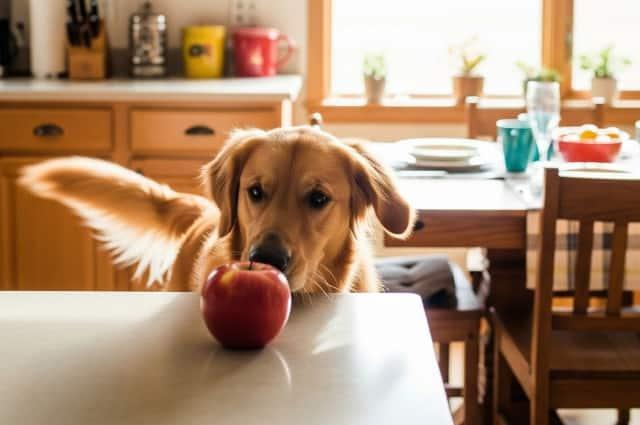
Safe Human Foods for Dogs - Vegetables
Many vegetables are safe and healthy for dogs, providing essential nutrients with fewer calories than commercial treats:
Carrots: Low in calories and high in fibre and vitamins. Carrots can be served raw as a crunchy treat or cooked for easier digestion.
Green Beans: Whether raw or steamed, green beans are a nutritious, low-calorie treat high in iron and vitamins.
Pumpkin: Plain cooked pumpkin is excellent for digestive health and can help with both diarrhoea and constipation.
Sweet Potatoes: Cooked sweet potatoes provide beta-carotene, vitamins, and fibre. Avoid raw sweet potatoes as they may be difficult to digest.
Broccoli: Safe in very small quantities, but can cause gastric irritation if given in large amounts due to isothiocyanates.
Cucumber: Low in calories and high in water content, making them an excellent treat for overweight dogs.
Celery: Contains vitamins A, B, and C and may help freshen your dog's breath.
Peas: Fresh peas are fine for dogs, but avoid canned peas with added sodium.
Always cook starchy vegetables like potatoes and sweet potatoes before serving, and cut all vegetables into bite-sized pieces to prevent choking.
Safe Human Foods for Dogs - Proteins
Protein is an essential part of a dog's diet, and many human protein sources can be shared with your pet:
Chicken: Plain, cooked, boneless, skinless chicken is a healthy protein source for dogs. Never feed your dog cooked chicken bones, as they can splinter and cause internal damage.
Turkey: Like chicken, plain cooked turkey is safe for dogs. Avoid seasonings and remove all bones and skin.
Lean Beef: Cooked, lean beef is a healthy protein source rich in iron, vitamins, and minerals.
Fish: Cooked salmon, tuna, and sardines can be beneficial for dogs, providing omega-3 fatty acids that support skin and coat health. Always remove bones and cook thoroughly.
Eggs: Cooked eggs are a great source of protein. Raw eggs carry a risk of salmonella and may cause biotin deficiency if fed regularly.
When preparing these proteins for your dog, avoid using oils, butter, salt, or spices, as these additives can be harmful or lead to digestive upset.


Tasty Tips
Safe Human Foods for Dogs - Grains and Other Foods
Several grains and other food items can be safely shared with your dog:
Rice: Plain, cooked white or brown rice can be easy on the stomach.
Oatmeal: Plain, cooked oatmeal provides fibre and can be beneficial for older dogs who may have irregular bowel movements. Avoid flavoured oatmeal with added sugars.
Plain Popcorn: Unsalted, unbuttered popcorn can be a low-calorie treat. Ensure there are no unpopped kernels, which can damage teeth or pose a choking hazard.
Yogurt: Plain, unsweetened yogurt contains probiotics that can benefit the digestive system. Avoid yogurts with artificial sweeteners, especially xylitol.
Peanut Butter: A favourite treat for many dogs, peanut butter is a good source of protein and healthy fats. Only use peanut butter that doesn't contain xylitol, a sweetener that is extremely toxic to dogs.
As with all treats, these should be offered in moderation and adjusted based on your dog's size, weight, and any existing health conditions.
Human Foods to Avoid
While many human foods are safe for dogs, others can be harmful or even fatal. Here's a list of foods that dogs should never consume:
Chocolate: Contains theobromine and caffeine, which dogs cannot metabolise effectively. Depending on the type and amount, chocolate can cause vomiting, diarrhoea, rapid breathing, increased heart rate, seizures, and in severe cases, death.
Grapes and Raisins: Can cause kidney failure in dogs. Even small amounts can make a dog severely ill.
Onions and Garlic: All forms (raw, cooked, powdered) can destroy a dog's red blood cells, leading to anaemia.
Avocados: Contain persin, which can cause vomiting and diarrhoea in dogs.
Alcohol: Even small amounts can cause vomiting, diarrhoea, decreased coordination, central nervous system depression, difficulty breathing, tremors, abnormal blood acidity, coma, and death.
Caffeine: Similar to chocolate, caffeine can be fatal to dogs as they cannot metabolise it effectively.
Macadamia Nuts: Can cause weakness, hyperthermia, vomiting, tremors, and elevated heart rate.
Xylitol: This sweetener is found in many sugar-free products and can cause insulin release, leading to liver failure. Initial symptoms include vomiting, lethargy, and coordination problems.
Cooked Bones: Can splinter and cause damage or blockage in a dog's digestive tract.
If your dog consumes any of these foods, contact your veterinarian immediately.
Feeding Human Foods as Treats
When incorporating human foods into your dog's diet, follow these guidelines:
The 10% Rule: Treats, including human food, should make up no more than 10% of your dog's daily caloric intake to maintain nutritional balance.
Portion Control: Adjust portions based on your dog's size and weight. A Great Dane can handle more than a Chihuahua.
Introduce New Foods Gradually: Start with small amounts of new food to monitor for any adverse reactions or allergies.
Preparation Matters: Serve foods plain, without added salt, sugar, spices, or fats, which can be harmful to dogs.
Creative Serving Ideas: Use Kong toys or puzzle feeders filled with dog-safe human foods like mashed pumpkin or peanut butter for mental stimulation.
Remember that even safe foods can become problematic if fed in excess. Obesity in dogs can lead to numerous health issues, including diabetes, heart disease, and joint problems.
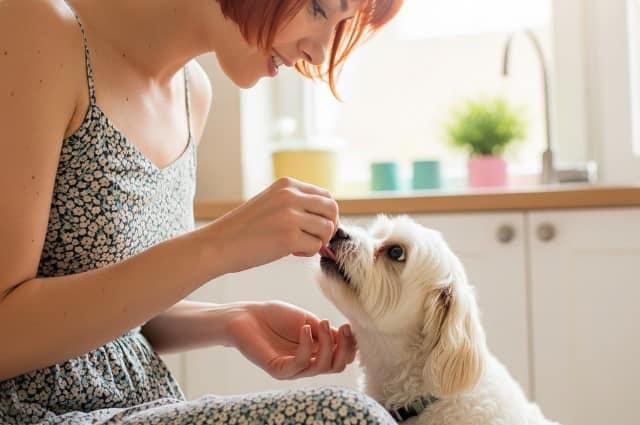
Food Allergies and Sensitivities in Dogs
Like humans, dogs can develop allergies or sensitivities to certain foods. Signs of food allergies in dogs may include:
Itchy skin, especially around the face, paws, and ears
Digestive issues like vomiting or diarrhoea
Chronic ear infections
Excessive licking, especially of the paws
Hair loss
Skin rashes or hives
However, true allergies are uncommon and grains even more so. If you suspect your dog has a food allergy, consult your veterinarian, who may recommend an elimination diet or specialised food like Hill's Prescription Diet z/d, which is formulated to help avoid adverse food reactions.
When introducing new human foods to your dog, start with a small amount and watch for any negative reactions. If your dog shows any signs of allergies, discontinue that food immediately and consult your veterinarian.
Frequently Asked Questions
Can dogs eat dairy products? Some dogs can tolerate dairy in small amounts, while others may be lactose intolerant. Hard cheeses like cheddar typically contain less lactose than milk and may be better tolerated. Monitor your dog for signs of digestive upset when introducing dairy.
Are nuts safe for dogs? Most nuts are not recommended for dogs. Macadamia nuts are toxic, while others like almonds and walnuts pose choking hazards and may cause stomach upset due to their high fat content. Peanuts (technically legumes) are generally safe in moderation, preferably served in butter form without added salt or sugar.
Can dogs eat bread? Plain bread in small amounts is generally safe for dogs but provides little nutritional value. Bread dough containing yeast is dangerous as it can expand in the warm environment of the stomach, causing bloat or even alcohol poisoning from the fermenting yeast.
What should I do if I'm unsure about a particular food? When in doubt, it's best to err on the side of caution and avoid feeding your dog that food until you can consult with your veterinarian. You can also reference reliable resources from veterinary organisations.
Foods like Hill's Science Diet offer complete nutrition, but safe human foods can be enjoyable occasional treats. Each dog has unique needs, so introduce new foods gradually and avoid toxic items. When uncertain or if your dog has health concerns, consult your veterinarian. Treating your dog mindfully with safe human foods can enhance your bond while maintaining their health and happiness.
Related products

This weight management and mobility support dog food was created with Hill’s unique understanding of the biology of overweight dogs.

Advanced nutrition shown to support joint health and improve mobility
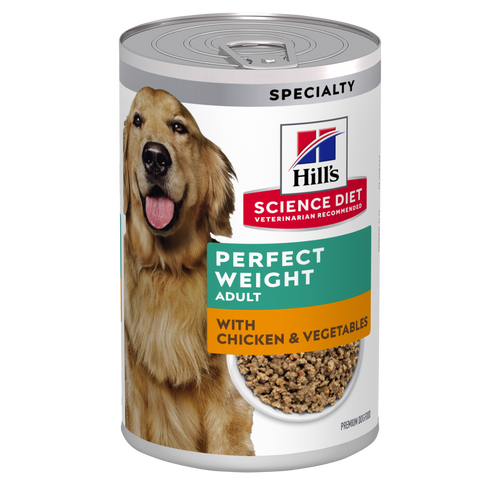
Over 70% of dogs lost weight within 10 weeks when fed this nutrition

Supports energy level, joint health, and beautiful coat in large breed mature dogs
Related articles

Learn what you can feed your pregnant or nursing dog to keep her and her new pups healthy.

Selecting the right food for your puppy is a key to quality nutrition and a long, healthy life., Learn more about how to select the right puppy food.
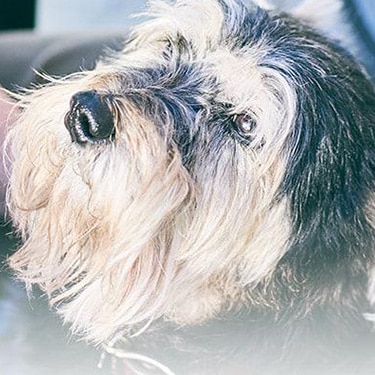
Though it may seem like your four-legged friend loves nothing more than to nap on the couch, dogs need regular exercise to stay healthy just like people do.
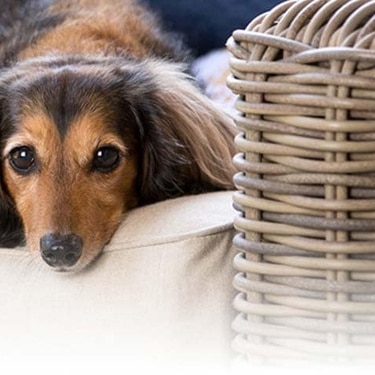
A dog with a sensitive stomach has special needs. Learn more about sensitive stomach symptoms in your dog, what you can do to help sooth your pet’s insides and get recommendations on sensitive stomach dog food.

Put your dog on a diet without them knowing
Our low calorie formula helps you control your dog's weight. It's packed with high-quality protein for building lean muscles, and made with purposeful ingredients for a flavorful, nutritious meal. Clinically proven antioxidants, Vitamin C+E, help promote a healthy immune system.
Put your dog on a diet without them knowing
Our low calorie formula helps you control your dog's weight. It's packed with high-quality protein for building lean muscles, and made with purposeful ingredients for a flavorful, nutritious meal. Clinically proven antioxidants, Vitamin C+E, help promote a healthy immune system.


